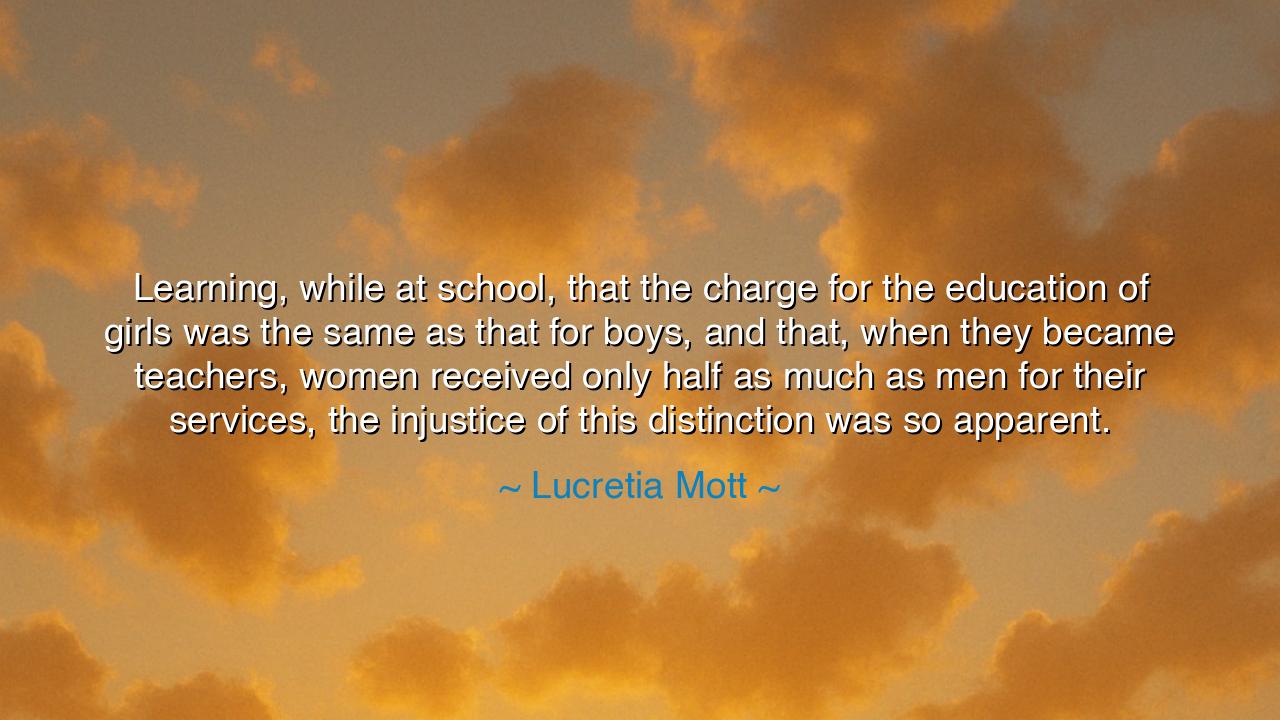
Learning, while at school, that the charge for the education of
Learning, while at school, that the charge for the education of girls was the same as that for boys, and that, when they became teachers, women received only half as much as men for their services, the injustice of this distinction was so apparent.






“Learning, while at school, that the charge for the education of girls was the same as that for boys, and that, when they became teachers, women received only half as much as men for their services, the injustice of this distinction was so apparent.” Thus spoke Lucretia Mott, one of the great voices of America’s conscience — a reformer, a teacher, and a fierce advocate for equality in both heart and law. In these words, drawn from the story of her own youth, she reveals not merely an observation of inequality, but the awakening of moral clarity — the moment when the veil of custom was torn away, and the truth of injustice stood unveiled before the eyes of a young and courageous soul.
When Mott speaks of learning this truth “while at school,” she recalls her own early confrontation with the world’s unfairness. As a young student in the late 18th and early 19th centuries, she discovered a cruel contradiction: that the education of women was valued equally in cost, but not in worth. Parents paid as much to educate a girl as they did a boy — yet when that girl grew into a woman and offered her labor as a teacher, her work was deemed of lesser value. This hypocrisy struck Mott like lightning. It was not a complex philosophical argument that stirred her spirit, but the simplicity of justice itself — that equal service should receive equal reward, that equal minds should be given equal respect. Thus, her quote is not only a memory, but a moral revelation — the birth of a lifelong mission to right what society had long excused.
This awakening marked the beginning of Mott’s journey as a reformer. She lived in an age when women were denied the right to vote, to hold public office, and even to speak freely in many assemblies. Yet she saw through the deceit of these boundaries, recognizing that every form of inequality begins in the quiet acceptance of small injustices. The unequal payment of women teachers, the silencing of women’s voices, the legal subjugation of wives — all were born of the same root: the belief that one half of humanity was less deserving than the other. Mott’s discovery at school thus became the seed of her moral fire, one that would later inspire her leadership in both the abolitionist movement and the fight for women’s rights.
In her life’s work, we see this principle made manifest. Mott became one of the founders of the Seneca Falls Convention in 1848, the first great gathering for women’s suffrage in the United States. She stood beside Elizabeth Cady Stanton, another daughter of justice, and together they proclaimed that “all men and women are created equal.” But decades before that declaration, Mott had already grasped its essence as a child. The injustice she saw in the schoolhouse — that small but telling disparity in value — became her first lesson in the nature of power: that the world’s greatest evils often begin as accepted norms, and that it takes courage to name them as wrong.
Her insight finds echo across the ages. Consider the story of Malala Yousafzai, the young Pakistani girl who, centuries later, would also confront the injustice of education denied to women. Like Mott, she too saw that the worth of a mind does not depend on gender. For daring to learn and speak, she was attacked, yet her spirit did not falter. Through her, the world remembered what Mott had declared long ago — that education is not a privilege of one sex, but a right of all souls, and that those who seek to divide it by gender divide humanity itself. Both women, separated by centuries but united by truth, show that to awaken to injustice is the first act of freedom, and to resist it is the first act of wisdom.
Thus, Mott’s quote shines not only as a remembrance of personal awakening but as a mirror held to every generation. Each era must confront its own hidden inequalities — those that are so “apparent,” yet so easily ignored by custom or convenience. It is easy to walk past injustice when it does not wound us personally, but Mott teaches that the measure of one’s morality is not in what affects the self, but in what offends the soul. Her clarity — that injustice, when seen, must be named — is a truth eternal and universal.
So, my children, let her words be more than history; let them be commandment. Wherever you see unequal measure — in pay, in respect, in opportunity — remember Mott’s early awakening. Question what is “normal,” for much of what is unjust hides beneath that name. Do not wait until the world agrees that wrong is wrong; truth does not require consensus, only courage. Speak, act, and correct the balance where you stand.
For as Lucretia Mott discovered in her youth, the world’s chains are not broken by grand gestures alone, but by the awakening of a single heart to the apparent injustice before it. The moment one mind sees clearly, the world begins to change. And so it falls to each of us — students, teachers, and seekers alike — to let our own hearts awaken as hers did, and to live in such a way that equality, once seen, can never again be unseen.






AAdministratorAdministrator
Welcome, honored guests. Please leave a comment, we will respond soon